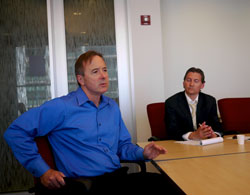Claypool Looking to "Right the Financial Ship" at CTA

The need to repair the transit agency’s financial situation was one of the common themes in CTA President Forrest Claypool’s interview with local bloggers earlier this week.
In referencing both plans to rebuild the North Side Red & Purple Lines and extend the Red Line further south to 130th, Claypool highlighted the need for a new federal transportation bill.
For the North Side Red & Purple Line modernization, Claypool said that the CTA intends to apply for federal “new starts” funding for the project. Currently, such funds can’t be used to overhaul existing infrastructure, but Claypool hopes that the new transportation bill will change that.
“The Senate version of the transportation bill, which is in concurrence now with the House, allows for core expansion, which means that if it’s a new railroad that just happens to be within an existing right of way, that’s considered a new start,” Claypool said, adding that he’s cautiously optimistic that the Senate version of the bill will pass.
In identifying some of the other challenges facing the CTA, Claypool discussed the need to balance the agency’s operational budget and negotiate a new labor agreement.
“I inherited a $277 million budget deficit, which is twenty percent of our operating budget,” Claypool said. “We whacked that down to $160 million and then we essentially punted for a year through one-time fixes and borrowing so that we could negotiate a new labor agreement.”
Claypool says that the current labor cost structure is simply “out of whack” with modern economic realities. He’s hoping that a new labor agreement will be in place by the end of the year.
“We want to try to gain more flexibility in some of these archaic work rules which really prevent the types of efficiencies and effective maintenance and management that we need to build a modern system,” Claypool said. “If we can do that and maintain service, that also means we’re maintaining good jobs that pay good benefits for the union workers.”
Claypool also discussed a recent request for proposals issued by the CTA that’s asking for private companies to provide “bus garage operations management” for the agency’s 74th Street bus garage. He described the proposal as a possible way to improve performance and inject competition amongst bus garages. But Claypool stressed that no decisions have been made on whether or not to follow through on the plan.
“We wanted to see what a private company might propose to us in terms of managing our workforce, under the existing work rules and existing labor agreements, to see if we could learn better procedures and the like,” Claypool said. “If nothing else, to inject some competition.”
Despite the ongoing struggle to reduce operational costs, Claypool says he sees “doomsday” budget scenarios as a thing of the past.
”[Our transit system] has been neglected and it’s been mismanaged, but we’re going to put the doomsday scenario behind us, we’re going to right the financial ship, and we’re going to build and invest in the future. And we’re going to bring modern management techniques so that our customers receive the comfortable, consistent, and reliable experience that they deserve,” Claypool said. “I think we made a lot of progress in a year but obviously we’ve got much more to do.”